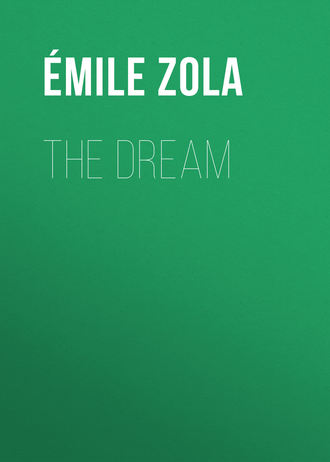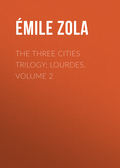
Эмиль Золя
The Dream
CHAPTER XIII
Since the return of his son to him Monseigneur’s days had been full of trouble. After having banished him from his presence almost immediately upon the death of his wife, and remaining without seeing him for twenty years, lo! he had now come back to him in the plenitude and lustre of youth, the living portrait of the one he had so mourned, with the same delicate grace and beauty. This long exile, this resentment against a child whose life had cost that of the mother, was also an act of prudence. He realised it doubly now, and regretted that he had changed his determination of not seeing him again. Age, twenty years of prayer, his life as clergyman, had not subdued the unregenerate man within him. It was simply necessary that this son of his, this child of the wife he had so adored, should appear with his laughing blue eyes, to make the blood circulate so rapidly in his veins as if it would burst them, as he seemed to think that the dead had been brought to life again. He struck his breast, he sobbed bitterly in penitence, as he remembered that the joys of married life and the ties springing therefrom were prohibited to the priesthood. The good Abbe Cornille had spoken of all this to Hubertine in a low voice and with trembling lips. Mysterious sounds had been heard, and it was whispered that Monseigneur shut himself up after twilight, and passed nights of combat, of tears and of cries, the violence of which, although partly stifled by the hangings of his room, yet frightened the members of his household. He thought that he had forgotten; that he had conquered passion; but it reappeared with the violence of a tempest, reminding him of the terrible man he had been formerly – the bold adventurer, the descendant of brave, legendary chieftains. Each evening on his knees he flayed his skin with haircloth, he tried to banish the phantom of the regretted wife by calling from its coffin the skeleton which must now be there. But she constantly appeared before him, living, in the delicious freshness of youth, such as she was when very young he had first met her and loved her with the devoted affection of maturity. The torture then recommenced as keen and intense as on the day after her death: he mourned her, he longed for her with the same revolt against God Who had taken her from him; he was unable to calm himself until the break of day, when quite exhausted by contempt of himself and disgust of all the world. Oh! Divine love! When he went out of his room Monseigneur resumed his severe attitude, his expression was calm and haughty, and his face was only slightly pale. The morning when Felicien had made his confession he listened to him without interruption, controlling himself with so great an effort that not a fibre of his body quivered, and he looked earnestly at him, distressed beyond measure to see him, so young, so handsome, so eager, and so like himself in this folly of impetuous love. It was no longer with bitterness, but it was his absolute will, his hard duty to save his son from the ills which had caused him so much suffering, and he would destroy the passion in his child as he wished to kill it in himself. This romantic history ended by giving him great anxiety. Could it be true that a poor girl – a child without a name, a little embroiderer, first seen under a pale ray of moonlight, had been transfigured into a delicate Virgin of the Legends, and adored with a fervent love as if in a dream? At each new acknowledgment he thought his anger was increased, as his heart beat with such an inordinate emotion, and he redoubled his attempts at self-control, knowing not what cry might come to his lips. He had finished by replying with a single word, “Never!” Then Felicien threw himself on his knees before him, implored him, and pleaded his cause as well as that of Angelique, in the trembling of respect and of terror with which the sight of his father always filled him. Until then he had approached him only with fear. He besought him not to oppose his happiness, without even daring to lift his eyes towards his saintly personage. With a submissive voice he offered to go away, no matter where; to leave all his great fortune to the Church, and to take his wife so far from there that they would never be seen again. He only wished to love and to be loved, unknown. Monseigneur shook from trembling as he repeated severely the word, “Never!” He had pledged himself to the Voincourts, and he would never break his engagement with them. Then Felicien, quite discouraged, realising that he was very angry, went away, fearing lest the rush of blood, which empurpled his cheeks, might make him commit the sacrilege of an open revolt against paternal authority.
“My child,” concluded Hubertine, “you can easily understand that you must no longer think of this young man, for you certainly would not wish to act in opposition to the wishes of Monseigneur. I knew that beforehand, but I preferred that the facts should speak for themselves, and that no obstacle should appear to come from me.”
Angelique had listened to all this calmly, with her hands listlessly clasped in her lap. Scarcely had she even dropped her eyelids from time to time, as with fixed looks she saw the scene so vividly described – Felicien at the feet of Monseigneur, speaking of her in an overflow of tenderness. She did not answer immediately, but continued to think seriously, in the dead quiet of the kitchen, where even the little bubbling sound of the water in the boiler was no longer heard. She lowered her eyes and looked as her hands, which, under the lamplight, seemed as if made of beautiful ivory. Then, while the smile of perfect confidence came back to her lips, she said simply:
“If Monseigneur refuses, it is because he waits to know me.”
That night Angelique slept but little. The idea that to see her would enable at once Monseigneur to decide in her favor haunted her. There was in it no personal, feminine vanity, but she was under the influence of a deep, intense love, and her true affection for Felicien was so evident, she was sure that when his father realised it he could not be so obstinate as to make them both unhappy. Many times she turned restlessly in her bed as she pictured what would happen. Before her closed eyes Monseigneur constantly passed in his violet-coloured robe. Perhaps it was, indeed, through him, and by him, that the expected miracle was to appear. The warm night was sleeping without, and she eagerly listened for the voices, trying to know what the trees, the Chevrotte, the Cathedral, her chamber itself, peopled with such friendly shadows, advised her to do. But there was only an indistinct humming, and nothing precise came to her. It seemed, however, as if mysterious whispers encouraged her to persevere. At last she grew impatient of these too slow certitudes, and as she fell asleep she surprised herself by saying:
“To-morrow I will speak to Monseigneur.”
When she awoke, her proposed plan seemed not only quite natural but necessary. It was ingenuous and brave; born of a proud and great purity.
She knew that at five o’clock on every Saturday afternoon Monseigneur went to kneel in the Chapel Hautecoeur, where he liked to pray alone, giving himself up entirely to the past of his race and to himself, seeking a solitude which was respected by all connected with the Cathedral. As it fortunately happened, this was a Saturday. She quickly came to a decision. At the Bishop’s Palace, not only would she be apt to find it difficult to be received, but, on the other hand, there were always so many people about she would be ill at ease; whilst it would be so simple to await him in the chapel, and to introduce herself to Monseigneur as soon as he appeared. That day she embroidered with her usual application and composure. Firm in her wish, sure of doing the right thing, she had no impatient fever of expectation. When it was four o’clock she spoke of going to see the mere Gabet, and went out, dressed as for an ordinary walk, wearing her little garden-hat tied carelessly under her chin. She turned to the left, and pushing open the linted, stuffed door of the portal of Saint Agnes, let it fall back heavily behind her.
The church was empty; alone, the confessional of Saint Joseph was still occupied by a penitent, the edge of whose black dress was just seen as one passed. Angelique, who had been perfectly self-possessed until now, began to tremble as she entered this sacred, cold solitude, where even the little sound of her steps seemed to echo terribly. Why was it that her heart grew so oppressed? She had thought she was quite strong, and the day had passed most peacefully – she was so sure of being right in her desire to be happy. But now that she was ignorant of what might happen she turned pale as if guilty, quite frightened at thinking that she was to see Monseigneur, and that in truth she had come there expressly to speak to him. She went quietly to the Chapel Hautecoeur, where she was obliged to remain leaning against the gate.
This chapel was one of the most sunken and dark of the old Romanesque apse. Like a cave hewn in a rock, straight and bare, with the simple lines of its low, vaulted ceiling, it had but one window, that of stained glass, on which was the Legend of St. George, and in whose panes the red and blue so predominated that they made a lilac-coloured light, as if it were twilight. The altar, in black and white marble, was unornamented, and the whole place, with its picture of the Crucifixion, and its two chandeliers, seemed like a tomb. The walls were covered with commemorative tablets, a collection from top to bottom of stones crumbling from age, on which the deeply-cut inscriptions could still be read.
Almost stifled, Angelique waited, motionless. A beadle passed, who did not even see her, so closely had she pressed herself against the interior of the iron railing. She still saw the dress of the penitent who was at the confessional near the entrance. Her eyes, gradually accustomed to the half-light, were mechanically fixed upon the inscriptions, the characters of which she ended by deciphering. Certain names struck her, calling back to her memory the legends of the Chateau d’Hautecoeur, of Jean V le Grand, of Raoul III, and of Herve VII.
She soon found two others, those of Laurette and of Balbine, which brought tears to her eyes, so nervous was she from trouble and anxiety – Laurette, who fell from a ray of moonlight, on her way to rejoin her betrothed, and Balbine, who died from sudden joy at the return of her husband, whom she thought had been killed in the war. They both of them came back at night and enveloped the Castle with their immense, flowing white robes. Had she not seen them herself the day of their visit to the ruins, as they floated, towards evening, above the towers in the rosy pallor of the dusk? Ah! how willingly she would die as they did, although but sixteen years of age, in the supreme happiness of the realisation of her dream!
A loud noise which reverberated under the arches made her tremble. It was the priest who came out from the confessional of Saint Joseph and shut the door after him. She was surprised at no longer seeing the penitent, who had already gone. And when in his turn the clergyman went out by way of the sacristy, she realised that she was absolutely alone in the vast solitude of the Cathedral. At the loud sound of the door of the confessional, as it creaked on its hinges, she thought that Monseigneur was coming. It was nearly half an hour since she had expected him, yet she did not realise it, for her excitement prevented her from taking any note of time.
Soon a new name drew her eyes towards the tablets – Felicien III, who went to Palestine, carrying a candle in his hand, to fulfil a vow of Philippe le Bel. And her heart beat with pride as she saw before her, mentally, the youthful Felicien VII, the descendant of all these worthies, the fair-haired nobleman whom she adored, and by whom she was so tenderly loved. She suddenly became filled with pride and fear. Was it possible that she herself was there, in the expectation of bringing about a prodigy? Opposite her there was a fresher plaque of marble, dating from the last century, the black letters upon which she could easily read. Norbert Louis Ogier, Marquis d’Hautecoeur, Prince of Mirande and of Rouvres, Count of Ferrieres, of Montegu and of Saint Marc, and also of Villemareuil, Chevalier of the four Royal Orders of Saint Esprit, Saint Michel, Notre Dame de Carmel and Saint Louis, Lieutenant in the Army of the King, Governor of Normandy, holding office as Captain-General of the Hunting, and Master of the Hounds. All these were the titles of Felicien’s grandfather, and yet she had come, so simple, with her working-dress and her fingers worn by the needle, in hopes of marrying the grandson of this dead dignitary!
There was a slight sound, scarcely a rustling, on the flagstones. She turned and saw Monseigneur, and remained motionless at this silent approach without the pomp and surroundings she had vaguely expected. He entered into the chapel, tall, erect, and noble-looking, dressed in purple, with his pale face, his rather large nose, and his superb eyes, which still seemed youthful in their expression. At first he did not notice her against the black gate. Then, as he was about to kneel down, he saw her before him at his feet.
With trembling limbs, overcome by respect and fear, Angelique had fallen upon her knees. He seemed to her at this moment like the Eternal Father, terrible in aspect and absolute master of her destiny. But her heart was still courageous, and she spoke at once.
“Oh! Monseigneur, I have come – ”
As for the Bishop, he had risen immediately. He had a vague recollection of her; the young girl, seen first at her window on the day of the procession, and re-found a little later standing on a chair in the church; this little embroiderer, with whom his son was so desperately in love. He uttered no word, he made no gesture. He waited, stern and stiff.
“Oh! Monseigneur, I have come on purpose that you may see me. You have, it is true, refused to accept me, but you do not know me. And now, here I am. Please look at me before you repel me again. I am the one who loves, and am also beloved, and that is all. Nothing beyond this affection. Nothing but a poor child, found at the door of this church. You see me at your feet, little, weak, and humble. If I trouble you it will be very easy for you to send me away. You have only to lift your little finger to crush me. But think of my tears! Were you to know how I have suffered, you would be compassionate. I wished, Monseigneur, to plead my cause in my turn. I love, and that is why I kneel before you, to tell you so. I am ignorant in many ways; I only know I love. All my strength and all my pride is centred in that fact. Is not that sufficient? It certainly makes one great and good to be able to say that one really loves.”
She continued with sighs, and in broken phrases, to confess everything to him, in an unaffected outpouring of ardent feeling. It was a true affection that thus acknowledged itself. She dared to do so because she was innocent and pure. Little by little she raised her head.
“We love each other, Monseigneur. Without doubt he has already told you how all this came to pass. As for me, I have often asked myself the question without being able to reply to it. But we love each other, and if it is a crime to do so, pardon it, I beseech you, for it came from afar, from everything in short that surrounded us. When I realised that I loved him, it was already too late to prevent it. Now, is it possible to be angry on that account? You can keep him with you, make him marry some other person, but you cannot prevent him from giving me his heart. He will die without me, as I shall if obliged to part from him. When he is not by my side I feel that he is really near me, and that we will never be entirely separated, since we carry each other’s life with us. I have only to close my eyes to re-see him when I wish, so firmly is his image impressed upon my soul. Our whole natures are thus closely united for life. And could you wish to draw us away from this union? Oh! Monseigneur, it is divine; do not try to prevent us loving each other!”
He looked at her in her simple working-dress, so fresh, so unpretending, and attractive. He listened to her as she repeated the canticle of their love in a voice that both fascinated and troubled him, and which grew stronger by degrees. But as her garden-hat fell upon her shoulders, her exquisite hair seemed to make a halo around her head of fine gold, and she appeared to him, indeed, like one of those legendary virgins of the old prayer-books, so frail was she, so primitive, so absorbed in her deep feeling of intense and pure affection.
“Be good, be merciful, Monseigneur. You are the master. Do allow us to be happy!”
She implored him, and finding that he remained unmoved, without speaking, she again bowed down her head.
Oh! this unhappy child at his feet; this odour of youth that came up from the sweet figure thus bent before him! There he saw, as it were again, the beautiful light locks he had so fondly caressed in the days gone by. She, whose memory still distressed him after twenty years of penitence, had the same fresh youthfulness, the same proud expression, and the same lily-like grace. She had re-appeared; it was she herself who now sobbed and besought him to be tender and merciful.
Tears had come to Angelique, yet she continued to outpour her heart.
“And, Monseigneur, it is not only that I love him, but I also love the nobility of his name, the lustre of his royal fortune. Yes, I know well that being nothing, that having nothing, it seems as if I were only desirous of his money. In a way, it is true it is also for his wealth that I wish to marry him. I tell you this because it is necessary that you should know me thoroughly. Ah! to become rich by him and with him, to owe all my happiness to him, to live in the sweetness and splendour of luxury, to be free in our loving home, and to have no more sorrow, no misery around us! That is my ideal! Since he has loved me I fancy myself dressed in heavy brocades, as ladies wore in olden days; I have on my arms and around my neck strings of pearls and precious stones; I have horses and carriages; groves in which I take long walks, followed by pages. Whenever I think of him my dream recommences, and I say to myself, ‘This must all come to pass, for it perfects my desire to become a queen.’ Is it, then, Monseigneur, a bad thing to love him more because he can gratify all my childish wishing by showering down miraculous floods of gold upon me as in fairy-tales?”
He saw then that she rose up proudly, with a charming, stately air of a true princess, in spite of her real simplicity. And she was always exactly like the fair maiden of other years, with the same flower-like delicacy, the same tender tears, clear as smiles. A species of intoxication came from her, the warm breath of which mounted to his face – the same shadow of a remembrance which made him at night throw himself on his devotional chair, sobbing so deeply that he disturbed the sacred silence of the Palace. Until three o’clock in the morning of this same day he had contended with himself again, and this long history of love, this story of passion, would only revive and excite his incurable wound. But behind his impassiveness nothing was seen, nothing betrayed his effort at self-control and his attempt to conquer the beating of his heart. Were he to lose his life’s blood, drop by drop, no one should see it flow, and he now simply became paler, was silent and immovable.
At last this great persistent silence made Angelique desperate, and she redoubled her prayers.
“I put myself in your hands, Monseigneur. Do with me whatever you think best; but have pity when deciding my fate.”
Still, as he continued silent, he terrified her, and seemed to grow taller than ever as he stood before her in his fearful majesty. The deserted Cathedral, whose aisles were already dark, with its high vaulted arches where the daylight seemed dying, made the agony of this silence still harder to bear. In the chapel, where the commemorative slabs could no longer be seen, there remained only the Bishop in his purple cassock, that now looked black, and his long white face, which alone seemed to have absorbed all the light. She saw his bright eyes fixed upon her with an ever-increasing depth of expression, and shrunk from them, wondering if it were possible that anger made them shine in so strange a way.
“Monseigneur, had I not come to-day, I should have eternally reproached myself for having brought about the unhappiness of us both from my want of courage. Tell me then, oh, tell me that I was right in doing so, and that you will give us your consent!”
What use would there be in discussing the matter with this child? He had already given his son the reasons for his refusal, and that was all-sufficient. That he had not yet spoken was only because he thought he had nothing to say. She, no doubt, understood him, and she seemed to wish to raise herself up that she might be able to kiss his hands. But he threw them behind him violently, and she was startled at seeing his white face become suddenly crimson, from a rush of blood to his head.
“Monseigneur! Monseigneur!”
At last he opened his lips, to say to her just one word, the same he had said to his son:
“Never!”
And without remaining to pray that day, as was his wont, he left the chapel, and with slow steps soon disappeared behind the pillars of the apse.
Falling on the flagstones, Angelique wept for a long time, sobbing deeply in the great peaceful silence of the empty church.







